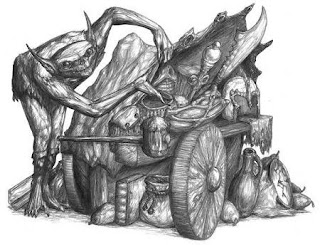I have trouble with analysis I think. I guess I need feedback on what to add and what not to add. I have issues with over-analyzing and summarizing, so I tried not to...now I think I may not have put enough :(
Jamie Cottrell
Cline
ENG 102
09-17-11
The Goblin's Cry!
"Goblin Market", a poem written by Christina Rosetti was full of amazing description and imagery. At first glance, the poem seems to be a fairy-tale with the goblins as the villains and Lizzie the heroin, yet there is more to it. It's a tale of temptation, yes, but also how monstrosities are hiding beneath what the surface shows. Laura is our victim showing what happens when we give into our temptations, and Lizzie shows us how we can over come our erosional fears and obstacles.
The poem opens up immediately with beautiful imagery of the goblins cry,
"Come buy our orchard fruits,
Come buy, come buy:" (Goblin Market: Lines 3&4)
drawing the reader in.
"Taste them and try:
Currants and gooseberries,
Bright-fire-like barberries,
Figs to fill your mouth,
Citrons from the South,
Sweet to tongue and sound to eye;
Come buy, come buy." (Goblin Market: Lines 25-31) Enticing the reader to want more. She makes the goblins' cry seem happy and merry. The words paint a picture of fruits a plenty, seeming harmless enough. It's almost as she wants us to use all of our senses to imagine how hard it must be for the maidens to ignore.
Getting to know the goblin men a little more, we learn that they aren't as pleasing as one would hope.
"One had a cat's face,
One whisk'd a tail,
One tramp'd at a rat's pace,
One crawl'd like a snail,
One like a wombat prowl'd obtuse and furry,
One like a ratel tumbled hurry scurry." (Goblin Market: Lines 71-76)
Rosetti describes them like little monsters. She gave them animalistic characteristics, but not the sweet furry kind. They have a creepy feeling; picturing half man-half animal crawling, and creeping, yet despite their hideous appearance, they are still sucking us in with their alluring voices.
"They sounded kind and full of loves" (Goblin Market: Line 79)
Their voices are what bring the story to a dark turn. Laura, despite her sisters' warning,
"No, no, no;
Their offers should not charm us,
Their evil gifts would harm us." (Goblin Market: Lines 64-66)
gives in to the goblin men.
"She clipp'd a precious golden lock,
She dropp'd a tear more rare than pearl,
Then suck'd their fruit globes fair or red:" (Goblin Market: Lines 126-128) The author put in line 127, because it shows that Laura was almost ashamed of what she was doing. She knew that their would be some sort of consequence, yet the goblin men were so intense she couldn't help herself. Everyone can relate to a situation where we have done something wrong because we can't handle the pressure of not knowing. Laura, unlike her sister hasn't been a very strong character.
Time goes by, and Laura has to deal with the effects of eating the forbidden goblin fruits.
"Laura turn'd cold as stone
To find her sister heard that cry alone," (Goblin Market: Lines 253&254) She can no longer hear the Goblin's cry, even though she longs for it.
"Day after day, night after night,
Laura kept watch in vain
In sullen silence of exceeding pain.
She never caught again the goblin cry:" (Goblin Market: Lines 269-272)
Things got worse and worse, until Lizzie decided she must do something to save her sister,
" Till Laura dwindling
Seem'd knocking at Death's door:
Then Lizzie weigh'd no more" (Goblin Market: Lines 320-322)
The poem looks up here, in a sense that it gives us hope. Lizzie is about to fight her demons and do something for her sister before it is too late. She knows what the monsters have done to Laura, yet her love overcomes her fear.
When she returns to hear the goblins, they try and coax Lizzie the way they did her sister,
"Hugg'd her and kiss'd her:
Squeez'd and caress'd her:
Stretch'd up their dishes,
Panniers, and plates:" (Goblin Market: Lines 348-351)
She pays then their money, but when she does not want to enjoy their fruits with them, they grow evil.
"They began to scratch their pates,
No longer wagging, purring,
But visibly demurring,
Grunting and snarling." (Goblin Market: Lines 390-393)
They become violent and mean. Lizzie takes a beating from the men, but despite their madness she never gives in.
"Though the goblins cuff'd and caught her,
Coax'd and fought her,
Bullied and besought her," (Goblin Market: Lines 424-426)
Lizzie triumphs over the goblin men, winning "Life out of death." (Goblin Market: Line 524)
In the end, good overcomes evil. Rosetti painted a beautiful and magical picture that draws us in, then turns for the worst. She uses incredible imagery that captivates the reader helping us to really see the ugly that is beyond something so enchanting. The lesson learned here is not only about not judging a book by its cover, but also our choices in life and how we must sometimes resist our deepest cravings as they may not always be what they seem.
Works Cited:
Rosetti, Christina. "Goblin Market." Goblin Market and other Poems. Cambridge: Macmillan, 1862. Print.
http://cdn.obsidianportal.com/assets/40909/Goblin_Market.JPG







